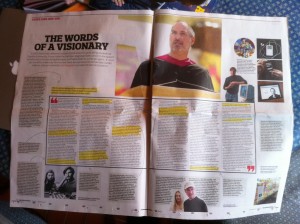
The Observer asked me to read Steve Jobs’s 2005 Stanford commencement address and add my comments to the text.
**The commencement address is one of the more venerable – and respectable – traditions of American academia, especially at elite universities such as Stanford and Harvard. Because Steve Jobs died at such a relatively young age (56) this is destined to be regarded as a classic. But it faces stiff competition – as the list maintained by humanity.org testifies. Jobs’s address is up against Barack Obama’s lecture to Wesleyan University in 2008, Elie Wiesel’s talk at DePaul University in 1997, Václav Havel’s lecture on “Civilisation’s Thin Veneer” at Harvard in 1995 and George Marshall’s address to the same university in 1947 – to list just four. But Jobs’s address has an unbearable poignancy just now, especially for those who knew him well. John Gruber, the blogger and technology commentator, saw him fairly recently and observed: “He looked old. Not old in a way that could be measured in years or even decades, but impossibly old. Not tired, but weary; not ill or unwell, but rather, somehow, ancient. But not his eyes. His eyes were young and bright, their weapons-grade intensity intact.” The address also reveals something of Jobs’s humanity, something that tended to get lost in the afterglow of Apple’s astonishing corporate resurgence. **
LATER: In my comments I related one of my favourite stories about Jobs — the one where he drops the first iPod prototype in a fish-tank to demonstrate that it’s too big. Frank Stajano emailed to say that it may be apocryphal — he’d heard it many years ago about Akio Morita and Sony’s Walkman. In trying to check I found this nice piece by D.B. Grady, who also tells the story but cautions “I have no way of knowing if it is true, so take it for what it’s worth. I think it nicely captures the man who changed the world four times over.”
Agreed. As the Italians say, if it ain’t true then it ought to be. (Hmmm… on reflection, I can’t find a source for that adage either. Apologies if I’ve been rude to the citizens of that lovely country.)


